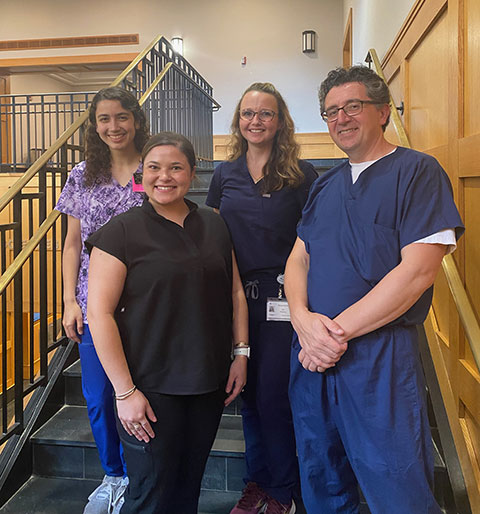Pediatric Fatty Liver Clinic
Fatty liver disease – now referred to as metabolic dysfunction-associated steatotic liver disease, or MASLD – is a widespread liver problem that affects many children and teenagers. It often occurs alongside obesity and metabolic issues. Here at the Kentucky Children's Hospital Pediatric Fatty Liver Clinic, we have a team of specialists dedicated to improving your child's liver health and helping your child manage their weight.
Providing early treatment for children who have excess fat in the liver can make a substantial difference in their liver health and prevent future liver-related problems. Currently, steatotic liver disease (SLD) is one of the most common reasons for liver transplants in adult patients. It is also the fastest-growing cause of liver transplants in young adults ages 18 to 25 years old. Since the disease may not show symptoms in its early stages, it is crucial to undergo screening for early detection. Ours is the only program of its kind in Kentucky that focuses on helping children with this condition. Together, we can take proactive steps to tackle the disease and promote your child's well-being.
What is MASLD?
Metabolic dysfunction-associated steatotic liver disease (MASLD) is a buildup of too much fat in the liver. Over time, this buildup can cause liver scarring (fibrosis) and, eventually, cirrhosis or liver failure. The previous name for MASLD was non-alcoholic fatty liver disease (NAFLD).
MASLD can develop at any age, but it often begins during childhood. The good news is that by losing just five percent of their body weight, children can reverse fat accumulation in the liver. Furthermore, shedding 10 percent of their body weight can lead to an improvement in liver scarring (fibrosis).
Risk factors for MASLD
Researchers don’t know exactly what causes metabolic dysfunction-associated steatotic liver disease, but risk factors include:
- Obesity
- Insulin resistance or diabetes
- Environmental factors, such as lack of access to fresh, healthy foods
- Excessive intake of sugar and fast food
- Inadequate physical activity (excessive screen time)
- Sleep apnea
- Family history of non-alcoholic fatty liver disease
- Genetic predispositions (ie. PNPLA3, TM6SF2, MBOAT7, GCKR, HSD17B13)
- Hispanic ethnicity
Children with obesity and insulin resistance are more likely to develop liver scarring and liver dysfunction.
Our team approach
 Your child’s treatment team will include experts in liver disease, nutrition and obesity. Your child’s team includes:
Your child’s treatment team will include experts in liver disease, nutrition and obesity. Your child’s team includes:
- A board-certified pediatric gastroenterologist who specializes in treating children with MASLD
- A pediatrician board-certified by the American Board of Obesity Medicine to diagnose and treat children with excessive weight gain
- A dietitian who evaluates children and provides nutritional counseling
- A nurse coordinator who schedules your child’s appointments and tests and further workup.
Your child might need to see other specialists to address the problems that can develop because of obesity. Our clinic works closely with specialists in endocrinology, genetics, neurology, nephrology, radiology and sleep medicine.
Diagnosing MASLD
First, we look for causes for your child’s liver disease, such as:
- Autoimmune issues
- Viral infections of the liver
- Abnormal iron or copper storage
- Common genetic causes of liver disease
- Thyroid issues
We then perform ultrasound-based imaging (FibroScan) to measure the amount of fat buildup and to look for scarring of the liver. FibroScan is a simple and painless procedure. It involves placing a probe on your child's skin and tapping on (sending sound waves to) their liver.
If your child is at risk for scarring of the liver, we further evaluate this risk with magnetic resonance imaging (MRI). This test doesn’t use radiation and can pick up even small signs of liver scarring.
When both imaging tests are suggestive of liver scarring, we may perform a liver biopsy. During a biopsy, your child will be completely asleep. We’ll insert a small needle into your child’s liver to remove a tiny sample of the tissue for testing.
MASLD treatment
Weight loss is the best way to treat MASLD. Successful treatment for obesity involves your whole family. You’ll receive nutrition and exercise counseling for your child. This will help you support your child during their weight management journey.
We’ll follow up with you and your child regularly. This will give you a chance to ask questions and get support. Steps we will recommend for your child typically include:
- Reducing and eliminating sugary drinks (soft drinks, fruit juice and smoothies)
- Choosing healthy foods
- Eating breakfast regularly and limiting food consumption in the evening
- Daily physical activity to help with weight loss
- Taking a vitamin E supplement
If your child has liver scarring, we may also recommend medications to help with weight loss and reverse the scarring. There are FDA-approved medications to help with weight loss for patients 12 years or older. Some teens 16 and over who struggle to lose weight may also be eligible for bariatric weight-loss surgery.
Our MASLD research
We study MASLD causes and treatment options, including medications and the impact of dietary counseling on children. This helps us learn more about the condition and develop new, effective treatments to help your child manage their MASLD and improve their liver function.
Your child may have the opportunity to take part in a clinical trial to help advance the treatment of MASLD.
For more information about our research, visit Dr. Softic's Scholars@UK profile or go to PubMed to see a complete list of publications.
Our clinic in the news
Here are the links to news segments featuring our clinic or providers.
“Fatty liver was a disease of the old. Then kids started getting sick.”
The Washington Post (An email address is required to read this article.)
“Fatty liver disease becoming more prevalent in children.”
Scripps News interview with Dr. Softic
Make an Appointment
Request an appointment online or call us at 859-218-4487.



